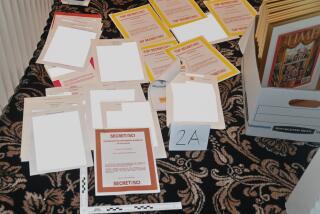A Blot on Britain’s Democracy
- Share via
Americans grow up thinking of Britain as the land of the Magna Carta, as a democracy much like our own in which civil liberties are zealously protected. In most respects, the impression is correct. The fact is, however, that when it comes to protecting so-called “secrets,” British governments act with a heavy-handedness that is appallingly inconsistent with democratic values.
While congressional investigators in this country are patiently digging out details of the once-secret Iran- contra operation in front of the television cameras, Prime Minister Margaret Thatcher’s government is engaged in a massive cover-up of far more serious allegations against the British intelligence services.
The controversy began when the government tried to prevent publication in Australia of a sensational book by Peter Wright, a retired senior officer in MI-5, Britain’s counterintelligence service. The case is still pending, but the book’s general content has become known.
Wright, who tells of uncovering as many as 40 “probable” spies in the course of investigating Communist infiltration of the intelligence services, names a former chief of Britain’s spy-catching agency as an actual Soviet agent.
Even more shocking, the book details an alleged plot among 30 senior MI-5 officers who, convinced in the mid-1970s that Labor Prime Minister Harold Wilson was a security risk, conspired to force him from office by smearing him as a Soviet spy. Wilson, in fact, resigned suddenly in 1976 amid rumors that MI-5 and MI-6, the agencies responsible for intelligence operations abroad, were plotting against him.
Wright’s credibility is open to challenge on grounds that, as his book makes evident, he bears a grudge against MI-5 for supposedly cheating him and other intelligence officers out of promised pensions. But it is self-evident that if his allegations are true, British democracy was gravely threatened by the people sworn to protect it.
The irony is that, so far, the British people know less about all this than careful newspaper readers in the United States and other countries. Thatcher’s government ordered British newspapers not to publish material from the book and is prosecuting one publication that defied the gag order, despite the fact that a story providing extensive material from the book was published by the Washington Post and distributed around the world.
This blatant interference with the British people’s right to know is made possible by the Official Secrets Act, which was passed in 1911 amid pre-World War I hysteria about German spies. It provides criminal penalties for officials who disclose official information, no matter how innocuous, without authorization. Reporters and editors who receive unauthorized information also can be prosecuted under the law.
The law can be used, and has been used, not just to protect national security information, but also to forbid disclosure of such facts as the location of potentially deadly toxic dumps and the health risk to asbestos workers.
Thatcher is rejecting demands for an investigation, although the intelligence services themselves are described as unhappy over simply allowing people to believe the worst. There is a chance that a full-fledged, though confidential, inquiry into the truth of Wright’s allegations will be held. It is also possible, though unlikely, that stricter oversight will be imposed on the intelligence services, which are now subject to far less control by elected officials than is the U.S. Central Intelligence Agency.
British newspapers would dearly love to have the Official Secrets Act modified. That isn’t likely to happen because high-ranking civil servants and politicians of all parties do not, for the most part, want to surrender the power of censorship. As long as this is true, British democracy will remain tainted by information controls that are more appropriate to a communist dictatorship.
More to Read
Sign up for Essential California
The most important California stories and recommendations in your inbox every morning.
You may occasionally receive promotional content from the Los Angeles Times.













